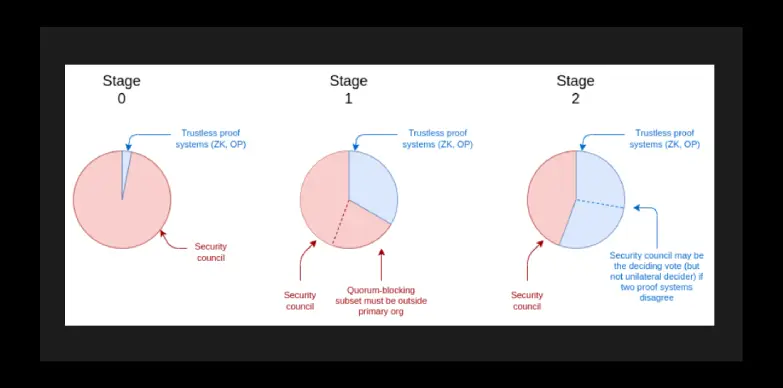Vitalik’s 3-Stage Plan to Secure and Decentralize Ethereum Rollups

Ethereum co-founder Vitalik Buterin has posted on social media platform X (formerly known as Twitter), a detailed three-stage framework for securing Ethereum roll-ups. The post emphasizes on a gradual transition from centralized oversight to trustless cryptographic security as the underlying proof system mature.
According to the post, the approach has been designed in such a way that it balances the need for security with the long-term goal of decentralization. This also ensures that the Layer-2 solutions can scale Ethereum safely and effectively.

The Three Stages of Rollup Security
Stage 0: Centralized Oversight
At this initial stage, a security council will have a full control over the rollup. While a proof system (such as optimistic or zero-knowledge proofs) may be operational, the council can override its decision with a simple majority vote.
This means that the proof system will serve only an “advisory” role, and ultimate authority will remain centralized. Buterin warns that stage 0 is the phase which offers the lowest level of security and has to be a temporary phase as it cannot be maintained for extended periods.
Stage 1: Threshold-Governed Intervention
In Stage-1 the security council’s power is reduced. Intervention now requires a supermajority, typically 6 out of 8 members must agree and a quorum-blocking subset must be external to the core organization. This setup makes it harder, but not impossible, to override the system. It is more decentralized and still has safety net for emergencies or unforeseen situations.
Stage 2: Trustless, Proof-Driven Security
At the final stage, the security council is allowed to step in only if there is a clear, provable error. The council cannot make arbitrary decisions and can only choose from objective and fact-based options. This makes system fully decentralized and trustworthy, relying on math and cryptography rather than relying on human judgement.

Vitalik Buterin Warns about Vulnerability
From the post, it can be clearly seen that Vitalik is emphasizing that the progression from Stage 0 to Stage 2 should be dictated by reliability and audit maturity of the proof system. There is only one reason through which there could be a delay in the full decentralization (Stage 2), which is when there is an insufficient trust in the proof systems.
Vitalik says that the confidence in the system would increase with audits, real-world testing, and the deployment of redundant proof systems.
Moreover, Buterin also warns about the risk of premature decentralization. According to him, if there is premature transition before the proof of system are thoroughly checked for, it could expose the users to vulnerabilities and if the system remains at Stage 0 for more than required time, it exposes the system to centralized failure or abuse.
Also Read: First Ever BNB ETF Filed by VanEck, Triggers Token Price Uptick


